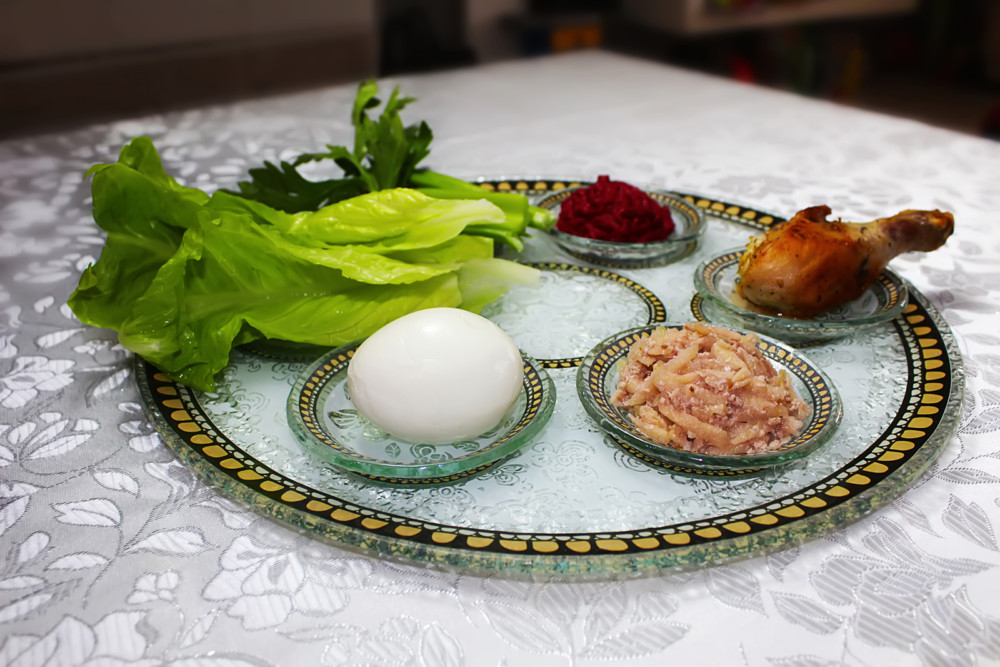By Mary Schmich
Chicago Tribune
WWR Article Summary (tl;dr) For many, Seder dinner has become virtual this year as loved ones figure out ways to be together when they are forced to be apart.
Chicago
Right about now in an ordinary year, Barbara Brotman and her husband, Chuck Berman, would be lugging chairs up from their basement, moving the living room furniture aside to make space for three long folding tables and spreading plastic over the pale taupe carpet because you never know who will spill what during a four-hour Passover Seder.
One year, before they took to rolling out the protective plastic, someone dropped a whole plate of Chicken Marbella, and the carpet never recovered.
In an ordinary year, the Seder guests would arrive around sundown, bearing charoset, kugel and green vegetables to go with the gefilte fish, matzo ball soup and chicken. In keeping with my culinary skills, I’d bring a couple of bottles of kosher-for-Passover wine.
For two decades, although I’m not Jewish, I’ve been lucky enough to be part of the Seder crew that Barbara and Chuck, both former Tribune colleagues, have hosted for more than 30 years.
During that time, their long Seder table has changed some. Babies were born. Kids grew up. Some longtime participants moved away. Barbara’s mother, who became a special guest after moving from New York to Chicago, died. These were momentous changes in their way, but the ritual and the crew have remained remarkably consistent, and the changes, the ordinary stuff of people growing up, moving on, growing older, happened in a familiar world.
That world is suddenly gone.
“We live in a very different time,” Gov. J.B. Pritzker said during a recent news conference, noting that major holidays of several religions occur this month, during a time of enforced social isolation aimed at conquering a deadly virus.
“We all should start to think about how we’re going to use technology in order for us to gather,” Pritzker advised. He noted that, in a nod to our new dependence on Zoom, some Jewish people are calling their Seders “Zeders.”
In any year, the Seder dinner is the time for telling the story of the Exodus, the liberation of the Israelites from slavery in ancient Egypt.
“It’s the foundational story of Judaism, and that means a lot to me as a Jew,” says Barbara. “But it’s universal. You can also look at it as escape from a narrow place in your life. It can be about personal growth. It doesn’t matter at our Seder who’s Jewish or who isn’t.”
In an ordinary year, guests take turns reading from the Haggadah, the Seder text that recounts the Exodus tale. At Barbara and Chuck’s dinner, the reading is often interrupted by questions and arguments:
Wait. Is this story true? Does it matter if it’s true? How does this story of slavery connect to slavery in today’s world? Is there really a God? Can someone please pass the matzo?
It’s a conversation meant for a shared table.
But in March it became clear that our social distancing rules would rule out a shared table this year. So Barbara joined the ranks of Seder hosts looking for a safer way, which meant she had to school herself on the intricacies of the videoconferencing platform Zoom
“Technology doesn’t come easily to me and it makes me anxious,” she says.
What would happen on Zoom to the readings that are done in unison? To the singing in unison? To the ritual beating of other guests with scallions?
Will guests suffer from Zoom fatigue, a recently diagnosed ailment in this age of constant video contact?
Despite her worries, she’s convinced it will be fun. And it might cast new light on the old story, on the discussion of plagues and hunger and freedom, on the expression of gratitude. The two ritual handwashings will take on new meaning.
“It almost feels like this time was meant for the Seder,” Barbara says, “or the Seder was meant for this time.”
In every facet of life right now, we’re living in a grand experiment. The religious rituals that so many people rely on are all part of the experiment.
But the essence of the rituals remains: to connect us to the past and to each other and to something beyond us. We don’t pretend nothing is different. We adapt while looking for the truths that stay constant.
So on Wednesday night at 6:30 p.m., if technology cooperates, 25 people will gather for Barbara and Chuck’s Zeder. Each of us will set our own table, prepare our own food and appreciate something we no longer think of as ordinary: We’re together.
___
Distributed by Tribune Content Agency, LLC.














































































































































































































































































































































































